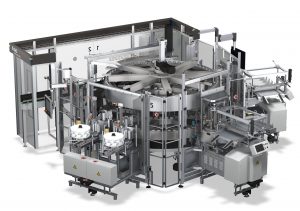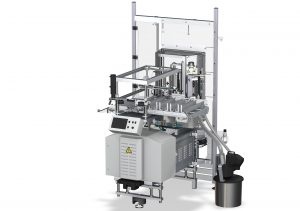
More and more customers are asking for modular systems and solutions. The KHS Group is thus systematically restructuring its engineering portfolio – also as regards labeling technology. Its prime move is the addition of the modular Innoket Neo Flex machine to its tried-and-tested Innoket Neo series. With its quick-change modules, this extremely flexible system masters all standard labeling techniques. Due to the low maintenance effort and long service life, users benefit from low operating costs.
With its new labeling machine, the KHS Group is consistently advancing its modular system design strategy and strengthening its portfolio in uniting the KHS Innoket Neo Flex and KHS Innoket Neo in a single series. This supersedes the previous Innoket SE generation of machines.

Flexibility first
According to the press release, with the Innoket Neo’s flexible design, the individual modules on this highly customizable labeler can be freely combined. Henrik Kahrmann, who works in product support at KHS, outlines the benefits. “In the past, there was a separate machine for each different labeling technique. This was optimized for its specific application area but reached its limits when customers wanted to expand their portfolio, for example, by adding self-adhesive labeling in combination with the classic cold glue method.”

The new Innoket Neo Flex goes several steps further when it comes to standardization and meets all customer demands in a single series – regardless of whether with permanently installed stations or as a modular machine. Depending on the machine size and respective requirements, the Flex series can be equipped with two to four modules. These are exchanged with just a few manual adjustments performed without tools.

Labeler convincing with its wide range of application
The Innoket Neo Flex also claims to demonstrate good flexibility in the choice and size of the container. According to the company, the machine labels both plastic and glass containers and cans in all standard sizes. The output totals up to 74,000 containers in an hour. Further, depending on requirements, all standard capacity ranges can also be accommodated.

The flexible Innoket Neo Flex can be used as either a single machine or as part of a production line. “Our labelers have been designed so that they can be easily integrated into any existing or planned line,” says Kahrmann.
Low maintenance and ease of operation
Another advantage of the new modular machine is its extreme ease of operation. With its patented folding door technology, the machine carousel and individual stations are readily accessible. Moreover, no additional cladding is required for the area beneath the machine table. In addition, operators profit from bearings lubricated for life, making the labeler extremely low maintenance and reducing the amount of lubricant needed. The new, ergonomic HMI provides great ease of operation. This can be moved by the operator to the required position very simply.
The Innoket Neo Flex is equipped with future-proof TIA technology from Siemens. “The combination of TIA Portal and SIMATIC S7-1500 controller results in significant performance benefits in the control unit’s reaction time,” Kahrmann explains. The labeling machine also has a simplified electronics concept, in which most of the components are installed in the control cabinet. The perfect combination of central and decentralized control calls for much less cabling.
Fast supply of spare parts and consumables
Parallel to the standardization of its machine series KHS has also significantly speeded up the supply of spare parts to its customers. At the same time, the supply for all existing machines continues to be ensured without limitation. For optimum operational behavior and low wear, KHS offers all of the necessary consumables such as glue and advises its customers on materials that are difficult to process at its label laboratory – especially set up for this purpose.
IndiFoodBev — authentic, impactful and influential
An English-language food and beverage processing and packaging industry B2B platform in print and web, IndiFoodBev is in its third year of publication. It is said that the Indian food and beverage industries represent approximately US$ 900 billion in revenues which implies more than 20% of the country’s GDP. Eliminating the wastage on the farmside can help to deliver more protein to a higher number of the population apart from generating sizable exports. The savings in soil, seeds, water, fertilizer, energy and ultimately food and nutrition could be the most immense contribution that country is poised to make to the moderation of climate change.
To improve your marketing and grow sales to the food and beverage processing and packaging industry, talk to us. Our research and consulting company IppStar [www.ippstar.org] can assess your potential and addressable markets in light of the competition. We can discuss marketing, communication, and sales strategies for market entry and growth.
Suppliers and service providers with a strategy and budget for targeted marketing can discuss using our hybrid print, web, video, and social media channels to create brand recognition linked to market relevance. Our technical writers are ready to meet you and your customers for content.
The second largest producer of fruit and vegetables in the world is continuously expanding processing capacities and delivery systems with appropriate innovative technologies. We cover product and consumer trends, nutrition, processing, research, equipment and packaging from farm to thali. Get our 2025 media kit and recalibrate your role in this dynamic market. Enhance your visibility and relevance to existing markets and turn potential customers into conversations. Ask for a sample copy of our bi-monthly in print or our weekly IndiFoodBev eZine each Wednesday.
For editorial info@ippgroup.in — for advertisement ads1@ippgroup.in and for subscriptions subscription@ippgroup.in
Naresh Khanna – 10 February 2025
Subscribe Now










